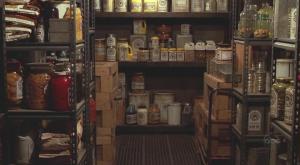If you could only store four foods for you and your family, what would they be? Come on, take your best guess. The good news is you could indeed survive with some knowledge and creativity on just four foods for you and your family for an entire year, and you wouldn’t necessarily get bored either. The reason I share these four foods with you is in response to so many pleas to simplify food storage. Although I feel more strongly about storing what you eat and eating what you store using the “meal method”, some folks just simply won’t tackle their food storage needs unless it’s broken down to ultra simple. Well, here’s ultra simple, broken down to just four foods.
Allow me to share with you what I call “The Vital Four.” I don’t call them that to be cute or cunning. These four foods are not only ideal and relatively simple to use, they are also still relatively affordable.
So, what would The Vital Four be? In order of priority:
-
-
- Wheat
- Powdered Milk
- Honey
- Salt
-
Now, before you get crazy, these foods would NOT be appropriate if you currently aren’t eating wheat. Remember that due to the significant lack of fiber in our diet today, if you were to go on an all wheat diet, you would be dead within 30 days due to the shock to your digestive system. So don’t plan on using these foods “cold turkey”, folks. You’ve got to get your body used to this kind of fiber ahead of time if you intend to survive on it. With four of the most simple foods, could this list be any more “ultra simple?”
So why this particular order?
Vital Four #1: Wheat. Wheat is at the top of the list due to its enormous amount of protein, multiple uses, fats, amino acids, carbohydrates, antioxidants, minerals and vitamins—not to mention its longevity in your storage. An unbroken wheat kernel has the ability to retain its fat without going rancid. For those of you who don’t know, wheat was discovered in the Egyptian pyramids dating back to 2500 BC. The story is told that 36 of the kernels were planted and grew and thrived into 1,500 bushels of wheat over six years. Even those who are gluten intolerant can still use wheat by sprouting it. Once you sprout it, it’s no longer a gluten compound. It’s a vegetable—particularly high in vitamin C and B which is great for blood sugar regulation and energy. (1 ounce of sprouted wheat contains an entire day’s supply of vitamin C.) In other words, sprouted wheat can compensate for the absence of fruits and vegetables in a diet. As you’ve heard me say, sprouting is ultra simple.
Vital Four #2: Milk. An important part of the “promised land” duo, milk has a great nutritional content–particularly protein and vitamin A and D, multiple convenient uses, and also stores very well–especially with today’s technological advances. Milk is a quality food which is found to be important for the proper function of the muscles and the bones, but even more so in times of stress. Very few foods can claim to assist the body in these two critical areas in one fail swoop, and none of the others I’ve found which do assist the body in this manner taste very good in baked goods, cheeses, and sauces like milk does. I mean really. Whoever heard of spinach cheese? There’s nothing difficult about using milk. Measure it. Water it. Mix it. That’s it. Super simple!
Vital Four #3: Honey. Honey is the ONLY food which stores indefinitely (except maybe Twinkies. But it remains to be seen whether we can really call the Twinkie “food”). It was also found in the Egyptian pyramids, and serves as a necessary sweetener in everything which may call for sugar. As you may have read in a previous article, it also has amazing medicinal virtues. One aspect you may not have considered is that the sweetness of honey is so fulfilling, it’s not likely to be over indulged in. The last thing you need in an emergency is to be addicted to a particular food. Unlike so many other sweeteners out there, honey is NOT addictive. In fact several university studies have shown that withdrawing from sugar is just as challenging to most humans as withdrawing from heroine. Honey also has small amounts of protein, iron, and vitamin C. Hmmm… sweet, nutritious, and an indefinite shelf-life. Sounds like a food storage dream.
Vital Four #4: Salt. Many folks are surprised to hear “salt” on my list of The Vital Four. Frankly, I’m surprised as well. I’m not one to “salt my foods. I rarely use it in my cooking, preferring other sources for a salty taste instead. In actuality, our bodies are just as reliant on salt as we are on water. In fact, it keeps our fluids in balance. It is necessary to all of the cellular processes in our body. ALL of them. It’s particularly necessary for muscle contractions, such as your heartbeat, nerve impulses, and the digestion of proteins. Our bodies do not produce salt. We deplete it through normal function. And we deplete a lot of salt when we’re involved in heavy labor or intense stress. Thus we must conscientiously feed it to our bodies. In addition to all of this, it’s also a great preservative for meats and vegetables without the need of any fancy equipment. Better yet, working salt into your diet doesn’t take any trickery.
If you want to still keep things ultra simple but add a few more “luxury items” to the list, I would recommend vegetable/olive oil, peanut butter, legumes, yeast, molasses, and dried fruits.
In summary, I find it interesting that The Vital Four are referred to in the Bible as foods of prominence: wheat—“the staff of life,” “land flowing with milk and honey” (mentioned 70 times in the Bible), and salt—“the salt of the earth” and “savor.” If you want a bundle of easy and creative recipes to use with your ultra simple food stores, I highly recommend Esther Dickey’s book, “Passport to Survival.” It was published in the late 60’s so you will most likely acquire a used copy on Amazon. But I find my copy to be just as useful—if not more so—today than perhaps it was intended to be several decades ago.
So I’ve made food storage as simple as is absolutely possible. Got any more excuses for delaying your food storage? 🙂
To see our upcoming event schedule, click here
Check out our inhome-course programs
Subscribe to Preparedness Pro today and never miss a thing!
For any questions or comments on this article, please leave a comment on the blog site so that everyone can benefit!
Copyright Protected 2009, Preparedness Pro and Kellene. All Rights Reserved. No portion of any content on this site may be duplicated, transferred, copied, or published without written permission from the author. However, you are welcome to provide a link to the content on your site or in your written works.







36 Comments
Logan · August 4, 2009 at 8:31 pm
Great Article Kellene. 🙂
Simplicity is almost always a good thing and it is a great way to lower anxiety on a subject.
As a head’s up I think the Vitamin A & D may not be in great abundance in the powdered milk since these are fat soluble vitamins and powdered milk is typically packaged as “non-fat dry milk” for a longer shelf life. I think you compensate for this however in your discussion of sprouting the wheat berries which is always a clever approach. 🙂
I would be interested to hear more about if this simplified diet indeed provides enough fat for human needs. I realize wheat berries do contain a bit of oil and that our bodies can convert carbohydrates to fats, however with our dietary needs of 15-20% fat the wheat seems like a paltry and absolute minimum source. Glad to see you added oil as your number 1 suggested additional item but I was thinking it may be more of a necessity than just a luxury. Its up for debate as far as nutrition science goes. 🙂
Again great article on simplicity and you hit all the necessary caveats. 🙂
1. Diet shock
2. Diet fatigue
3. Gluten allergies
4. Trace vitamins and minerals.
Cheers,
Logan.
Logan · August 4, 2009 at 8:31 pm
Great Article Kellene. 🙂
Simplicity is almost always a good thing and it is a great way to lower anxiety on a subject.
As a head’s up I think the Vitamin A & D may not be in great abundance in the powdered milk since these are fat soluble vitamins and powdered milk is typically packaged as “non-fat dry milk” for a longer shelf life. I think you compensate for this however in your discussion of sprouting the wheat berries which is always a clever approach. 🙂
I would be interested to hear more about if this simplified diet indeed provides enough fat for human needs. I realize wheat berries do contain a bit of oil and that our bodies can convert carbohydrates to fats, however with our dietary needs of 15-20% fat the wheat seems like a paltry and absolute minimum source. Glad to see you added oil as your number 1 suggested additional item but I was thinking it may be more of a necessity than just a luxury. Its up for debate as far as nutrition science goes. 🙂
Again great article on simplicity and you hit all the necessary caveats. 🙂
1. Diet shock
2. Diet fatigue
3. Gluten allergies
4. Trace vitamins and minerals.
Cheers,
Logan.
Todd · August 5, 2009 at 2:53 pm
I was going to ask if you would recomend a brand of milk. Is it blue chip morning moos? Is it not a true milk?
Todd · August 5, 2009 at 2:53 pm
I was going to ask if you would recomend a brand of milk. Is it blue chip morning moos? Is it not a true milk?
Diana Smth · August 5, 2009 at 7:20 pm
Well, as a beekeeper’s wife please be sure and store only pure honey; preferbly local honey as many of the generic brands of honey sold in grocery stores is from China or South America….places where we know they still use many toxic chemicals banned in the US long ago. Some honeys actually have high fructose corn syrup added…for what? Isn’t honey sweet enough???? Just a caution….DEE
Diana Smth · August 5, 2009 at 7:20 pm
Well, as a beekeeper’s wife please be sure and store only pure honey; preferbly local honey as many of the generic brands of honey sold in grocery stores is from China or South America….places where we know they still use many toxic chemicals banned in the US long ago. Some honeys actually have high fructose corn syrup added…for what? Isn’t honey sweet enough???? Just a caution….DEE
Kellene · August 5, 2009 at 7:38 pm
In my opinion, local honey is the ONLY way to go. How can you trust your honey if you don’t even know the area it’s produced? Also, it’s better for building up your immune system in your area–to partake of locally grown honey.
Kellene · August 5, 2009 at 7:38 pm
In my opinion, local honey is the ONLY way to go. How can you trust your honey if you don’t even know the area it’s produced? Also, it’s better for building up your immune system in your area–to partake of locally grown honey.
Michael · August 6, 2009 at 4:25 am
I’m pretty sure they found Twinkies in an Egyptian tomb as well. 🙂
Michael · August 6, 2009 at 4:25 am
I’m pretty sure they found Twinkies in an Egyptian tomb as well. 🙂
Kellene · August 17, 2009 at 6:41 pm
Our Costco only carries the white milk alternative. You would do better to actually call Blue Chip Foods and ask them for the info. They also can give you an update on who carries it in your area. I’m always pleasantly surprised.
Kellene · August 17, 2009 at 6:41 pm
Our Costco only carries the white milk alternative. You would do better to actually call Blue Chip Foods and ask them for the info. They also can give you an update on who carries it in your area. I’m always pleasantly surprised.
Kellene · September 7, 2009 at 4:10 pm
Yes, with little Sphynx characters adorning the top along with some beeswax birthday candles. They used them as birthday cakes believing that partaking of them would give them eternal life. 🙂
Kellene · September 7, 2009 at 4:10 pm
Yes, with little Sphynx characters adorning the top along with some beeswax birthday candles. They used them as birthday cakes believing that partaking of them would give them eternal life. 🙂
BLG · September 11, 2009 at 11:50 pm
Is butter a good alternative to oils? It will store indefinitely, and it’s cheap to buy….
BLG · September 11, 2009 at 11:50 pm
Is butter a good alternative to oils? It will store indefinitely, and it’s cheap to buy….
Kellene · September 12, 2009 at 12:07 am
Honey is the only food that will store indefinitely. Olive oil stores much longer than butter. And cold-pressed coconut oil stores even longer.
Butter does not tolerate as much heat before it burns as oil does.
Kellene · September 12, 2009 at 12:07 am
Honey is the only food that will store indefinitely. Olive oil stores much longer than butter. And cold-pressed coconut oil stores even longer.
Butter does not tolerate as much heat before it burns as oil does.
cari · September 20, 2009 at 5:13 am
Any way that you would reveal your source of where you bought your honey of 60 lbs. for $118? That’s a great price, especially for quality local honey. I’m in provo so anything within an hour’s distance north or south is no biggie.
cari · September 20, 2009 at 5:13 am
Any way that you would reveal your source of where you bought your honey of 60 lbs. for $118? That’s a great price, especially for quality local honey. I’m in provo so anything within an hour’s distance north or south is no biggie.
Kellene · September 20, 2009 at 5:12 pm
My husband did it through a church group that was able to negotiate a group buy. I’ll have to find out who the source was.
Kellene · September 20, 2009 at 5:12 pm
My husband did it through a church group that was able to negotiate a group buy. I’ll have to find out who the source was.
daphne · April 5, 2012 at 6:24 pm
I’m new and really needed this info. Thanx!
daphne · April 5, 2012 at 6:24 pm
I’m new and really needed this info. Thanx!
Barbra C · October 17, 2012 at 1:25 pm
I just found that very same book a week ago thanks to you and your suggestion to check out Desseret Industries. I didn’t even know there was one in my area. I found this book, a nursing assistant text book and a survival book with all kinds of traps and snares and how to use them. All for $2.75, an amazing score! Thank you for your advice 🙂
Barbra C · October 17, 2012 at 1:25 pm
I just found that very same book a week ago thanks to you and your suggestion to check out Desseret Industries. I didn’t even know there was one in my area. I found this book, a nursing assistant text book and a survival book with all kinds of traps and snares and how to use them. All for $2.75, an amazing score! Thank you for your advice 🙂
Comments are closed.